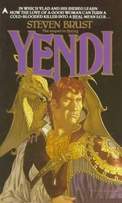
| Series: | Vlad Taltos #2 |
| Publisher: | Ace |
| Copyright: | July 1984 |
| Printing: | October 1984 |
| ISBN: | 0-441-94457-4 |
| Format: | Mass market |
| Pages: | 209 |
Yendi is a sequel of sorts to Jhereg, although it takes place earlier in Vlad's life than the previous novel. It could be read independently without much difficulty, but Jhereg sets up some of the world background and introduces us to the characters.
The start of Yendi is a bit tedious. Vlad begins here as a low-level mobster who controls a portion of the city, in between doing jobs as an assassin. A neighboring boss starts trying to horn in on his territory. A war ensues. The first half of the book is full of maneuvering in that war, while Vlad trying to survive and keep his business running, borrowing resources from friends to do it.
As with Jhereg, the banter and Vlad's first-person sarcastic commentary on the world are major features, but even with that enhancement, I found the mob war tedious. It fell far short of the twisty detective story of the previous book. Vlad's under-the-table loans from his friends and ongoing financial troubles provoked a bit of cringing and just aren't exciting reading.
Thankfully, the story picks up considerably about halfway through and we discover that this is the story of how Vlad meets Cawti. The focus shifts to their growing relationship, Cawti's partner, Dragaeran politics, and twisty underlying causes of the mob war that are more involved than they appeared. It's in this type of web of obligation, history, and scheming that this series shines. Vlad has less power than most of the people he hangs out with, but he's very good at puzzling through problems and political situations and knowing when to act. The banter with Cawti is excellent, as is the portrayal of their relationship. Brust avoids sappy stereotypes and annoying fumbling, maintaining a light, fun tone with occasional glimpses of emotional depth.
Underneath the plot, Brust continues to drop bits and pieces of the world background, but never as a sustained infodump. The reader picks up information that all the characters know by overhearing it and piecing things together. This can be a touch frustrating, but it keeps the pacing tight and is fun to watch even when it's confusing. There's a lot going on in Dragaeran politics and a lot of mysteries about the past of this world, and it feels like there are some booms coming. (Plus, there's another series set some time earlier in the same universe, which I expect fills in more of the gap.)
This is light reading, a bit shallower than Jhereg and not quite as good, but still good fun and a tight, short book to enjoy between other things. If the first part of the book doesn't do much for you, hang in there until 80 to 100 pages in and see if that changes; the second half of the book is much better than the first half.
Hopefully we'll also get more explanation of Vlad's friendship with so many powerful people. Here, they felt more like resources for Vlad to tap, which given Vlad's relative social class doesn't make much sense.
Followed by Teckla.
Reviewed: 2007-08-16